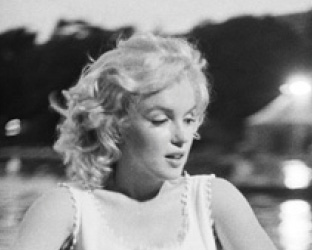What could there possibly be left to say about Marilyn Monroe?
Perhaps no other movie star has been so idolized and dissected by popular culture. This past year alone – the 50th anniversary of her passing into legend – saw several Marilyn-inspired works, including the delightful feature “My Week With Marilyn,” NBC’s addictive “Smash,” and Lois Banner’s well-meaning but ultimately misguided bio “Marilyn: The Passion and the Paradox,” which spends an awful lot of time speculating about her abusive childhood (instigated by a mentally unstable mother).
Culture cannot contain her, which may be the secret of her enduring allure. She is different things to different people in different times. Feminists, for instance, were slow to embrace her. But once Gloria Steinem wrote about her sympathetically in 1972, the tide turned and womankind felt free to embrace and reclaim her, looking past the blond bombshell named Norma Jeane after another bombshell, Jean Harlow.
The dumb blonde was an act, of course – a good act, one delivered without guile or malice, but an act nonetheless. It’s important to remember that true movie stars create personas that then play characters.
“Shall I be her?” Marilyn (Michelle Williams) tells a gobsmacked Colin Clark (Eddie Redmayne) in “My Week With Marilyn,” based on Clark’s memoir of his time as third assistant director and Marilyn-minder on the set of the disastrous “The Prince and the Showgirl.”
Marilyn then goes into her kewpie-doll shimmy to the delight of the staff of Windsor Castle, which she’s visiting on a day off. The truth of the moment cuts past desired flesh to the bone. Susan Strasberg – daughter of Marilyn’s Actors Studio mentors, Lee and Paula – has often told stories of how Norma Jeane could turn Marilyn on and off just by the way she carried herself on a Manhattan street.
The real Marilyn read books, wrote poetry, cultivated intellectuals and honed her skills as a comedienne (“Some Like It Hot”), tragedienne (“The Misfits”) and a great still-camera actress as a memorable 2004 Brooklyn Museum show, “I Want To Be Loved By You,” attested. She was, as Maureen Dowd wrote in a New York Times’ column, something we rarely see anymore – an aspirational figure.
That she recognized in the end the limitations of both playing and being Marilyn was, of course, her undoing. Hollywood biographer Donald Spoto, who has a knack for forensic research, holds that she died accidentally just as she was on the verge of getting back together with Joe DiMaggio, her controlling, protective second husband. Conspiracy theorists like to point the finger at the Kennedys, although Arthur Schlesinger in “Robert Kennedy: His Life and Times” makes a persuasive case for Bobby being a confidant and consigliere in her contract negotiations with 20th Century Fox rather than a lover.
Maybe it was an accidental barbiturate overdose. Who knows how many suicides regret the act too late? More than any other form of death, suicide – particularly the suicide of a young person, Marilyn was 36 – begs the question, “Why?” But Occam’s razor states that the truth lies with the argument that contains the least number of hypotheses. The “truth” of Marilyn, victimizer as well as victim, was that she had boxed herself into a life that had grown intolerable to her and so decided to end it.
And yet, she lives.
“It’s women that have kept Marilyn alive, not men,” Maureen Dowd quotes photographer Larry Schiller as saying.
Women can learn a lot from Monroe, a woman ahead of her time: Lift small dumbbells to strengthen the muscles that support the breasts. Splash your face with cold water 32 times to tone the skin. Outline the outer edges of the lips to make them appear plumper.
But perhaps the greatest lesson she has to offer is that sex symbols have a short expiration date. Best to have a backup plan and be wary of would-be lovers who fail to understand that playing a bombshell is different than being one.
In a post-feminist age when women are continually assaulted by images and books in which women are portrayed as little more than their bodies, is it any wonder that we flock to her?
She is, after all, one of us.


